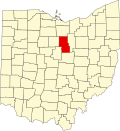2010 census
As of the census [14] of 2010, there were 1,918 people, 826 households, and 529 families residing in the village. The population density was 700.0 inhabitants per square mile (270.3/km2). There were 882 housing units at an average density of 321.9 per square mile (124.3/km2). The racial makeup of the village was 97.7% White, 0.5% African American, 0.2% Native American, 0.1% Asian, 0.1% from other races, and 1.5% from two or more races. Hispanic or Latino of any race were 0.5% of the population.
There were 826 households, of which 27.6% had children under the age of 18 living with them, 51.0% were married couples living together, 9.7% had a female householder with no husband present, 3.4% had a male householder with no wife present, and 36.0% were non-families. 32.6% of all households were made up of individuals, and 16.3% had someone living alone who was 65 years of age or older. The average household size was 2.32 and the average family size was 2.94.
The median age in the village was 42.8 years. 23.4% of residents were under the age of 18; 8.6% were between the ages of 18 and 24; 20.6% were from 25 to 44; 27% were from 45 to 64; and 20.5% were 65 years of age or older. The gender makeup of the village was 48.1% male and 51.9% female.
2000 census
As of the census [4] of 2000, there were 1,773 people, 751 households, and 504 families residing in the village. The population density was 615.9 inhabitants per square mile (237.8/km2). There were 799 housing units at an average density of 277.6 per square mile (107.2/km2). The racial makeup of the village was 98.82% White, 0.23% African American, 0.11% Native American, 0.23% Asian, 0.11% from other races, and 0.51% from two or more races. Hispanic or Latino of any race were 0.90% of the population.
There were 751 households, out of which 30.8% had children under the age of 18 living with them, 53.5% were married couples living together, 10.5% had a female householder with no husband present, and 32.8% were non-families. 29.7% of all households were made up of individuals, and 14.4% had someone living alone who was 65 years of age or older. The average household size was 2.36 and the average family size was 2.93.
In the village, the population was spread out, with 25.7% under the age of 18, 6.5% from 18 to 24, 28.5% from 25 to 44, 21.4% from 45 to 64, and 17.9% who were 65 years of age or older. The median age was 39 years. For every 100 females there were 88.8 males. For every 100 females age 18 and over, there were 84.6 males.
The median income for a household in the village was $34,492, and the median income for a family was $47,083. Males had a median income of $36,458 versus $21,800 for females. The per capita income for the village was $17,923. About 6.2% of families and 9.3% of the population were below the poverty line, including 15.8% of those under age 18 and 5.1% of those age 65 or over.





